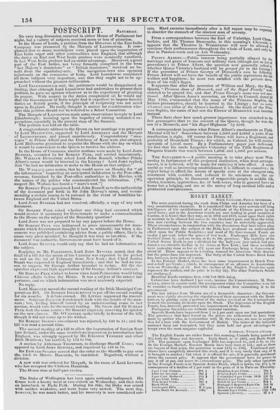POSTSCRIPT. SATURDAY.
No very long discussion occurred in either House of Parliament last night, but a variety of subjects received more or less of attention. No very long discussion occurred in either House of Parliament last night, but a variety of subjects received more or less of attention. In the House of Lords, a petition from the Directors of the East India Company was presented by the Marquis of LANSDOWNE. It com- plained that so many restrictions were placed upon the importation of East India sugar and other commodities into England, that although the duties on East and West India produce were nominally equalized, in fact West India produce had an unfair advantage. Moreover, a great part of the East Indies, not being formally comprised in the term "her Majesty's dominions" or " British dominions," received no be- nefit front the equalizing-acts. The navigation-laws also operated injuriously on the commerce of India. Lord Lansdowne considered all these subjects very important, and that they ought not to be ap- proached without the greatest deliberation. Lord ELLENROROUCH said, the petitioners would be disappointed on finding, that although Lord Lansdowne had undertaken to present their petition, he gave no opinion whatever as to the expediency of granting its prayer. With respect to the duties complained of, he would say that the Government of India might find it expedient to impose heavier duties on British goods, if the principle of reciprocity was not acted upon in England. He really thought it matter for consideration whe- ther this petition should not be referred to a Select Committee.
The Marquis of LANSDOWNE made some observations in reply to Lord Ellenborough ; insisting upon the impolicy of raising unfounded ex- pectations, especially in the present state of the finances. The petition was laid on the table.
A congratulatory address to the Queen on her marriage was proposed by Lore3IELBOUIINE, supported by Lord ABERDEEN and the Marquis of LONDONDERRY, and passed unanimously. Congratulatory " mes- sages " to Prince Albert and the Dutchess of Kent were also adopted. Lord Melbourne promised to acquaint the House with the day on which it would be convenient to the Queen to receive the address.
In the House of Commons, similar motions were made by Lord JOHN RUSSELL, seconded by Sir ROBERT PEEL, and carried unanimously. Mr. WILLIAM DUNCOMBE asked Lord John Russell, whether Prince Albert's name would be inserted in the Liturgy ? Lord Jolts: replied, that "he had no intimation to make to the House on that subject."
Mr. WALLACE gave notice, that he would move on Monday for " all the information" respecting an anticipated defalcation in the Post-office
revenue, furnished by the Post-office authorities to Mr. Herries, with the names of the parties who communicated the information. [We suspecf Mr. Wallace has found a " mare's nest."] Sir Ronuar PEEL questioned Lord John Russell as to the authenticity of the document put forth in Sir John Hervey's name, and recom- mending a certain course to be pursued in the event of hostilities be- tween England and the United States.
Lord JOHN RUSSELL had not received, officially, a copy of any such document.
Sir ROBERT PEEL asked whether any thing had occurred which would render it necessary for Government to make a communication to the llouse on the subject of the Boundary question?
Lord JOHN was not prepared to lay any papers before the House.
Sir RonEnr PEEL was indisposed to press unnecessarily for docu- ments which Government thought it best to withhold; but when a do- cument was published containing advice from a public officer, likely to cause very great mischief: he thought it was time to interfere. It' the document was authentic, Government must have heard of it.
Lord Jonsi Russ:ELL would only say that he had no information on the subject.
Replying to Mr. PAKINCTON, Lord JOHN RUSSELL stated, that the draft of a bill for the union of the Canadas was expected in the packet
to sail on the 1st of February from New York ; that Chief Justice Stuart was expected in England immediately ; and that he had no rea- son to suppose Sir George Arthur intended to resign. All the de- spatches expressed high approbation of Sir George Arthur's conduct.
Sir ROBERT PEEL wished to know when Lord Palmerston would bring Chinese affairs before the House. It was a subject of the utmost im- portance, and on which information was most anxiously expected.
No reply.
Lord Monl'ETH moved the second reading of the Irish Municipal Cor- porations Bill. Sir ROBERT INGLIS moved to put off the second reading for six months. A debate ensued. Mr. 'Arras supported the amend- ment. Sergeant JACKSON found much fault with the details of the mea- sure; but, feeling himself bound by an understanding come to last session, would vote for the second reading. Mr. SHAW and Sir Romea'v PEEL took the same course; Sir ROBERT expressly reserving his opinion on the new clauses. Mr. O'CoNNELL spoke briefly in favour of the bill, though it did not come up to his wishes.
Sir ROBERT Isoms's amendment was rejected, by 149 to 14 ; and the bill was read a second time.
The second reading of a bill to allow the importation of' foreign flour into Ireland, tinder the same restrictions imposed on its introduction into England, was strongly opposed by Mr. EMERSON TENSEST and other Irish Members ; but carried, by 114 to 102.
A motion by Alderman THOMPSON, to discharge Sheriff Evans, was opposed by Lord JOHN RUSSELL, and negatived by 149 to 70.
Sir Erma no Scents moved that the order to the Sheriffs to pay over the 6401. to Messrs. Hansards, he rescinded. Negatived, without a division.
A new writ was ordered for Morpeth, in the room of Lord Leveson, who has accepted the Chiltern Hundreds.
The House rose at half-past twelve.


























 Previous page
Previous page